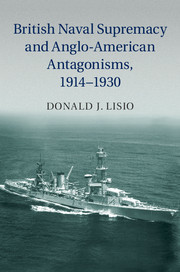Description
British Naval Supremacy and Anglo-American Antagonisms, 1914–1930
Author: Lisio Donald J.
This book analyzes British efforts to preserve its naval supremacy during the 1920s.
Language: English
Subject for British Naval Supremacy and Anglo-American Antagonisms...:
Approximative price 53.83 €
In Print (Delivery period: 14 days).
Add to cart
Publication date: 10-2014
344 p. · 15.8x23.5 cm · Hardback
344 p. · 15.8x23.5 cm · Hardback
Description
/li>Contents
/li>Biography
/li>
During World War I, Britain's naval supremacy enabled it to impose economic blockades and interdiction of American neutral shipping. The United States responded by building 'a navy second to none', one so powerful that Great Britain could not again successfully challenge America's vital economic interests. This book reveals that when the United States offered to substitute naval equality for its emerging naval supremacy, the British, nonetheless, used the resulting two major international arms-control conferences of the 1920s to ensure its continued naval dominance.
Introduction; 1. Clashing world interests; 2. Washington conference legacy; 3. Beatty's Japanese war plan; 4. Churchill's challenge; 5. Beatty embraces arms control; 6. The general boards' new hope; 7. American arms-control politics; 8. Beatty takes control; 9. Combat equivalency; 10. Beatty's new strategies; 11. Conference shocks; 12. Hardening positions; 13. The failure of the Anglo-Japanese Accord; 14. Cabinet crisis; 15. Final efforts; 16. Breakdown and recriminations; 17. Conclusion.
Donald J. Lisio is the Henrietta Arnold Professor Emeritus of History at Coe College. His previous publications include The President and Protest: Hoover, Conspiracy, and the Bonus Riot (1974) and Hoover, Blacks, and Lily Whites: A Study of Southern Strategies (1994). He received his PhD from the University of Wisconsin, Madison.
© 2024 LAVOISIER S.A.S.




